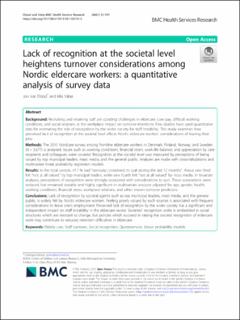| dc.contributor.author | Elstad, Jon Ivar | |
| dc.contributor.author | Vabø, Mia | |
| dc.coverage.spatial | Norden | en_US |
| dc.date.accessioned | 2021-08-05T14:13:43Z | |
| dc.date.available | 2021-08-05T14:13:43Z | |
| dc.date.created | 2021-08-03T15:17:15Z | |
| dc.date.issued | 2021-07-27 | |
| dc.identifier.citation | BMC Health Services Research. 2021, 21 . | en_US |
| dc.identifier.issn | 1472-6963 | |
| dc.identifier.uri | https://hdl.handle.net/11250/2766573 | |
| dc.description.abstract | Background: Recruiting and retaining staff are standing challenges in eldercare. Low pay, difficult working conditions, and social relations at the workplace impact on turnover intentions. Few studies have used quantitative data for estimating the role of recognition by the wider society for staff instability. This study examines how perceived lack of recognition at the societal level affects Nordic eldercare workers’ considerations of leaving their jobs. Methods: The 2015 Nordcare survey among frontline eldercare workers in Denmark, Finland, Norway, and Sweden (N = 3,677) is analysed. Issues such as working conditions, financial strain, work-life balance, and appreciation by care recipients and colleagues, were covered. Recognition at the societal level was measured by perceptions of being valued by top municipal leaders, mass media, and the general public. Analyses are made with cross-tabulations and multivariate linear probability regression models. Results: In the total sample, 41.1 % had “seriously considered to quit during the last 12 months”. About one third felt “not at all valued” by top municipal leaders, while one fourth felt “not at all valued” by mass media. In bivariate analyses, perceptions of recognition were strongly associated with considerations to quit. These associations were reduced, but remained sizeable and highly significant in multivariate analyses adjusted for age, gender, health, working conditions, financial stress, workplace relations, and other known turnover predictors. Conclusions: Lack of recognition by societal agents such as top municipal leaders, mass media, and the general public, is widely felt by Nordic eldercare workers. Feeling poorly valued by such sources is associated with frequent considerations to leave one’s employment. Perceived lack of recognition by the wider society has a significant and independent impact on staff instability in the eldercare sector. Societies’ recognition order is embedded in social structures which are resistant to change, but policies which succeed in raising the societal recognition of eldercare work may contribute to reduced retention difficulties in eldercare. | en_US |
| dc.description.sponsorship | The study is part of the research project “CONTEXT – Creating integrated person-centred care in different settings”, funded by the Research Council of Norway, project no. 273696. | en_US |
| dc.language.iso | eng | en_US |
| dc.publisher | BMC | en_US |
| dc.relation.ispartofseries | BMC Health Services Research;21, Article number: 747 (2021) | |
| dc.relation.uri | https://doi.org/10.1186/s12913-021-06734-4 | |
| dc.rights | Navngivelse 4.0 Internasjonal | * |
| dc.rights.uri | http://creativecommons.org/licenses/by/4.0/deed.no | * |
| dc.subject | Elderly care | en_US |
| dc.subject | Staff turnovers | en_US |
| dc.subject | Social recognition | en_US |
| dc.subject | Questionnaires | en_US |
| dc.subject | Linear probability models | en_US |
| dc.title | Lack of recognition at the societal level heightens turnover considerations among Nordic eldercare workers: a quantitative analysis of survey data | en_US |
| dc.type | Peer reviewed | en_US |
| dc.type | Journal article | en_US |
| dc.description.version | publishedVersion | en_US |
| dc.rights.holder | © The Author(s). 2021 | en_US |
| dc.source.articlenumber | 747 | en_US |
| cristin.ispublished | true | |
| cristin.fulltext | original | |
| cristin.qualitycode | 2 | |
| dc.identifier.doi | https://doi.org/10.1186/s12913-021-06734-4 | |
| dc.identifier.cristin | 1923708 | |
| dc.source.journal | BMC Health Services Research | en_US |
| dc.source.volume | 21 | en_US |
| dc.source.pagenumber | 10 | en_US |
| dc.relation.project | Norges forskningsråd: 273696 | en_US |

